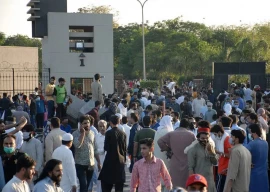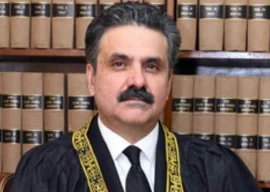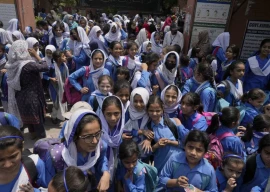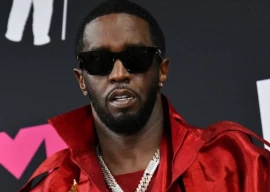
Malala is firmly stuck in a quagmire of bad PR.
‘Sellout’ is the meekest term fans have dubbed her after her badly timed photograph with Hillary Clinton at the premier of a Broadway musical Suffs. While Gaza erupts in flames, the Muslim world and sympathisers of peace in Palestine are high on emotion shouting for ceasefire, Malala is rubbing shoulders and co-producing a musical about the suffragette movement with literally the face of America's hawkish policies in the Middle East. Someone who was called a war criminal by her students just recently during a lecture.
It was the straw that broke the camel’s back for the few Pakistanis who tolerated Malala. There's no coming back from this photo op.
It's not that Malala has not ever spoken out against the Israeli oppression of Palestine; she has even donated millions in the past for schools in Gaza. In 2014, she gave away all her prize money upon receiving the prestigious World's Children's Prize. The entire amount of US$ 50,000 “will go to help students and schools in an especially difficult place – in Gaza,” she had announced.
Last October, she directed 300,000 dollars to three charities helping Palestinians under attack. However, her pledge for the Palestinian cause has been muted in the public realm. Nothing of the fiery freedom rhetoric that shot her to fame, nothing defiant or rousing against Israel's genocidal regime.
From ruling the hearts of her admirers and those who listened to her articulate and powerful address at the UN in 2013, Malala’s public image kept shrinking in Pakistan while it expanded in the West. She was a lion heart at the age of 16, when she called upon the world to put education first, “One child, one teacher, one pen and one book can change the world.”
Once she started college at Oxford she showed that she wanted to live like a normal teen for a while. Not returning to Pakistan also meant her connection with her admirers in the homeland faded some more. However, her connection with the West grew. She was going places. Especially with her appearances on famous late-night talk shows and then after marriage her presence at most red-carpet events including the Oscars and Wimbledon and film premiers. The rights activist was having a little fun seeing the sights and scenery of Hollywood and the celebrity life either side of the pond, with her new husband on her arm.
Her loyalists continued to cheer her on, she was representing a modern and progressive face of a Pakistani Muslim woman who is cool enough to hobnob with superstars.
The current photo of her and Hillary has drawn a line. It really sticks in the craw of public sentiment because of who Clinton is and what she not only represents but has actively has done. The name is synonymous to warmongering, Benghazi and drone strikes. Iraq, Pakistan, Syria, Yemen, Libya, Afghanistan are all conflict zones that were Hillary's boardgame once she was secretary of state.
When we see her, we don't think of the Hillary Doctrine which argues that women’s rights and violence against women should be considered national security issues. If that was her legacy then we would forgive Malala's blind spot.
A review of The Hillary Doctrine: Sex & American Foreign Policy, by Valerie M. Hudson and Patricia Leidl offers a succinct insight: “Clinton was vocal about women’s rights and empowerment in some countries (for example, Afghanistan) but silent about others (Saudi Arabia, China). In a close examination of USAID’s work they (the authors) found that the rhetoric at the top did not often match the reality on the ground. An interview with a gender adviser on a USAID-funded project revealed that “too few in-country USAID employees fully understand why gender programming is so critical”.
So too Malala has failed to bridge the gap of equal human rights for all across borders, not just American ‘colonies’ dependent on US aid. What little connection she has to her homeland is through Malala Fund which runs totally on US donor money. She has become today a textbook example of Western NGOs co-opting indigenous movements and social changemakers to exploit them for imperialist prerogatives. A commenter on X wrote, “Your handlers must love you. You never stray from your talking points.”
In her acceptance speech in Oslo she said her Nobel “is for those voiceless children who want change. I’m here to stand up for their rights, to raise their voice.” But her silence is precisely what has disillusioned her fellow Pakistanis today. That is those who idolised her as a young hero despite the majority of the nation that called her a western puppet from the get go.
Malala has forgotten her own words. “When the whole world is silent even one voice becomes powerful,” she had said, giving the world another epic quotable quote for Goodreads. Thus she has rendered hollow the rhetoric she built to reach lofty ideals of world peace and equality.
In November last year, the philanthropist put forth an unequivocal demand for a full ceasefire, stating, “We must keep speaking out for them (children in Gaza) — for a full ceasefire and more humanitarian aid. The needless suffering must end.” The activist articulated her take as a quote reply to her October 20 post where she urged people to sign a petition against Israel’s military strikes on children.
The post read, “Join me in adding your name to this petition demanding that Israel halt its assault on schools and places where children are seeking shelter and that leaders reach a deal to release all children being unjustly held hostage or imprisoned.”
In Pakistan, Malala was always a grey character as she was looked upon with suspicion by the Pashtuns. Locals had shared unfavourable views of her father Ziauddin as soon as he and his daughter's names entered the mainstream media. The two came to symbolise the tussle between conservative and liberal views in the country. Each end of the spectrum scoffing at the other and casting aspersions on their intelligence to accept the ‘truth’. The liberals disgusted at the scepticism of the conspiracy theorists, who claimed the father was an agent of Jewish and American powers, were in turn maligned for having a colonial mindset and being slaves to Westernisation.
Interestingly, Malala herself has never been asked by the Western media to address this dichotomy and the scepticism her nation has for her celebrity. The foreign media has only glowing praises for the child who stood up to its enemy, the Taliban.
Of course, as a nation we are loath to give recognition to the marginalized members of society. Pakistan's father of physics Abdul Salam was forced to self exile when his religious community was ruthlessly persecuted in the 1950s. Despite working and living abroad, Salam founded Pakistan's space program. It takes hard work for a state to willfully forget the huge legacy and contribution made by its own citizen. Like the youngest Nobel Peace Prize winner Malala, Salam gained acknowledgement for his endeavours in Physics upon the world stage. Then he was forgotten even in Pakistan's textbooks.
Salam had a career before he left the country and it only flourished. Malala's contribution in Pakistan is less visible. She mostly provides fodder for the debate she personifies. Her career is activism and her legacy the Malala Fund, which did not originate in Pakistan or with Pakistani stakeholders. With her latest debacle of shaking hands with supporters and funders of Israel, and largely keeping mum about the genocide, Malala has further eroded her connection with her nation and its sentiments. It remains to be seen whether the Western media will defend her silence or finally confess some disappointment in a Pakistani girl it adopted to fight for human rights.




1734609344-0/Untitled-(69)1734609344-0-165x106.webp)
1721739746-0/BeFunky-collage-(12)1721739746-0-165x106.webp)





1724319076-0/Untitled-design-(5)1724319076-0-270x192.webp)
1734468458-0/Copy-of-Untitled-(50)1734468458-0-270x192.webp)

1734511806-0/Untitled-design-(5)1734511806-0-270x192.webp)









COMMENTS
Comments are moderated and generally will be posted if they are on-topic and not abusive.
For more information, please see our Comments FAQ